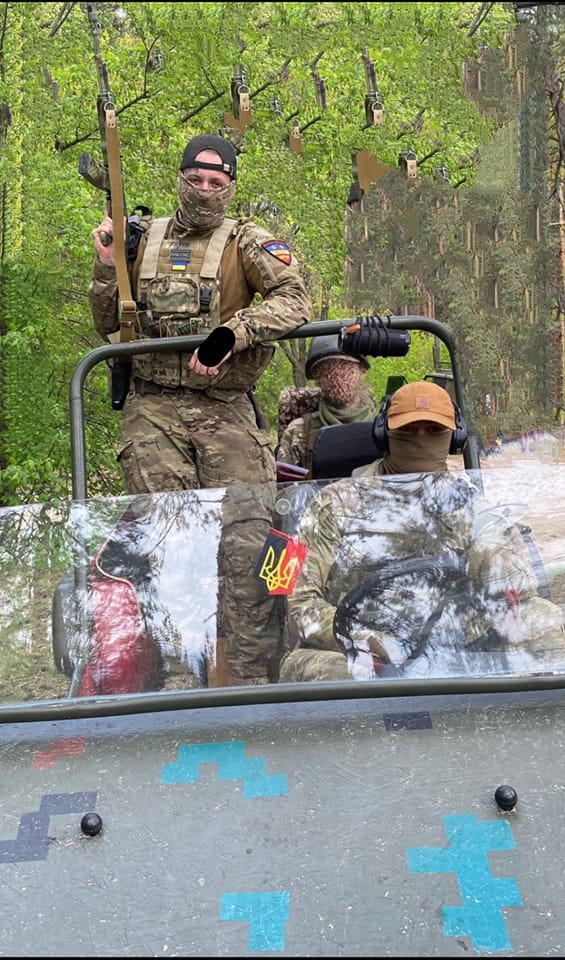
The Unsung Heroes of the War in Ukraine
The news from the Ukrainian front isn’t good. But many people there are doing great deeds with little or no recognition. These heroes are the doctors, nurses, and volunteers who are providing frontline trauma and medical care to those injured in combat and deployed personnel.

A combat medic of the Norman Brigade–Brigade Normande riding alongside Ukrainians in a tactical buggy. Photo: Norman Brigade–Brigade Normande, (CC BY-SA 3.0 license, via Wikimedia Commons)
Currently in Ukraine, medics put their own lives in danger by evacuating wounded soldiers from the battlefield. Medical practitioners, including doctors, medical students, nurses, and emergency medical responders such as paramedics, save lives through emergency treatment. When the wounded are pulled out of battle, the medical practitioners take them to what’s called a stabilization point, where they provide life-saving support to stabilize them as much as possible to keep the soldiers alive long enough to make it to the hospital. According to Radio Free Europe/Radio Liberty, “80 percent of wounded suffer from blast injuries caused by mines or artillery fire.”
Between February 2022 and April 2024, the World Health Organization (WHO) “verified 1682 attacks on health care in Ukraine, resulting in 128 deaths and 288 injuries of medical personnel and patients. WHO defines an attack on health care as any act of verbal or physical violence, obstruction or threat of violence that interferes with the availability, access and delivery of curative and/or preventive health services during emergencies. This can range from harm caused by heavy weapons to psychosocial threats and intimidation that affect access to health care for those in need.”
The heroes saving lives include volunteers in the Awangarda group, who have assisted medics and evacuation teams since the beginning of the war. In its words, the Polish non-governmental organization Awangarda “supports Ukrainian soldiers and medics with personnel on the battlefields of Ukraine. Awangarda’s teams consist of paramedics, nurses, doctors and ambulance drivers. Their personnel have advanced tactical awareness skills vital for saving lives in combat zones.”
Then there’s the Ukrainian Hospitallers unit, a civilian paramedic force founded in 2014 by Yana Zinkevych, a paraplegic Ukrainian member of parliament and a military veteran. Its members have been operating in Ukrainian war zones “for the sake of every life,” according to its motto. The unit is comprised of doctors and other professionals, all volunteers, who receive medical training and first-aid courses. They provide initial medical assistance on the frontlines, as well as post-hospital support and rehabilitation to people affected by military actions.
We’re here so the brave men and women on the front know there’s a capable medical team just a few hundred metres away that’s embedded with them. A team who’ll stay put no matter how bad things get.”
– Project Konstantin, a charitable organization supporting the Ukrainian military
Another outfit helping to save lives in Ukraine is MOAS (Migrant Offshore Aid Station), an international humanitarian non-governmental organization. It aims to “extend life-saving assistance and medical care to the world’s most vulnerable communities amidst crises.” On the frontlines since 2022, MOAS runs “an emergency response operation with our all-Ukrainian team of 150 doctors, nurses, paramedics, drivers, and 50 ambulances.” The organization estimates it has saved 38,000 lives and treated 25,000 patients in communities cut off from healthcare through its Mobile Medical Unit.
The combat medics and civilian volunteers involved in medical support for Ukraine’s defense forces have shown great determination, skill, compassion, and courage. Some have lost their lives while trying to rescue others. They are all the unsung heroes of the war in Ukraine.
I want children. I want a house. I want to plant tomatoes… but ending the war is the most important.”
– Hospitaller Iryna Tsybukh, known as “Cheka,” who died evacuating wounded near Kharkiv, Ukraine on May 29, 2024

